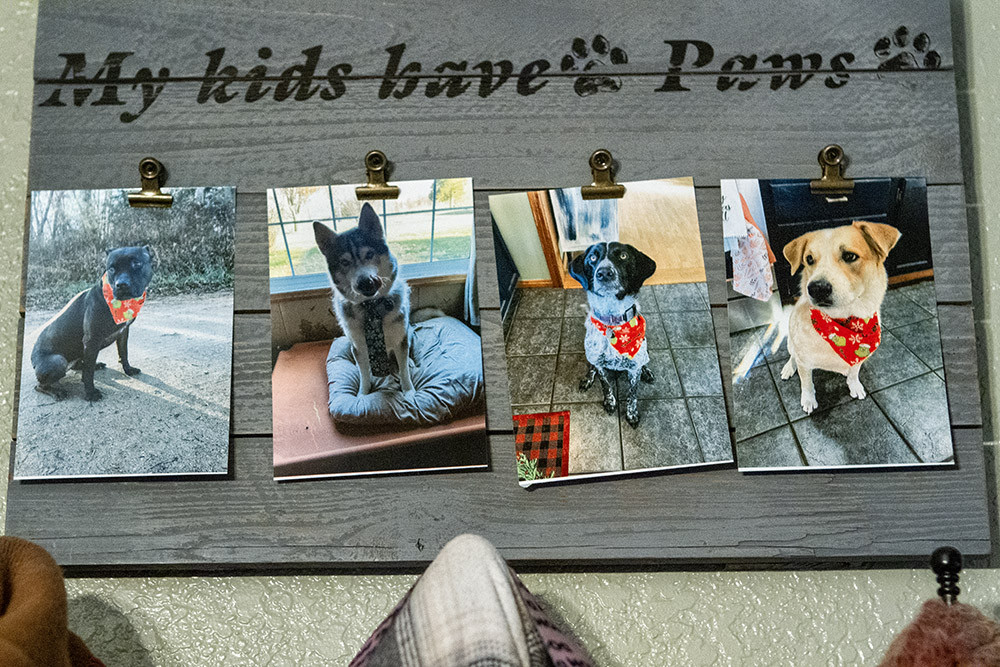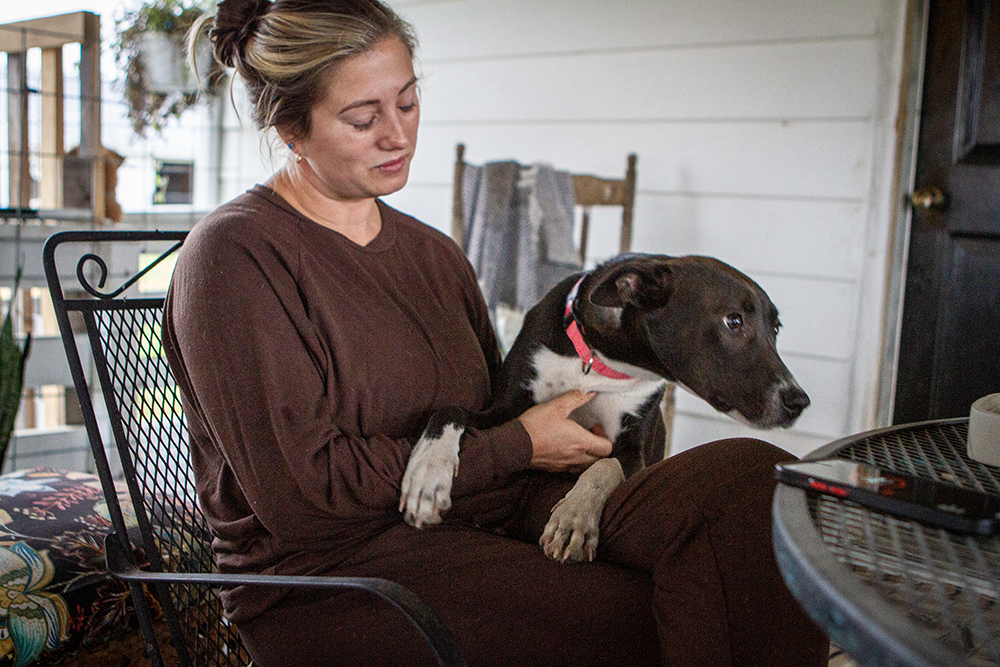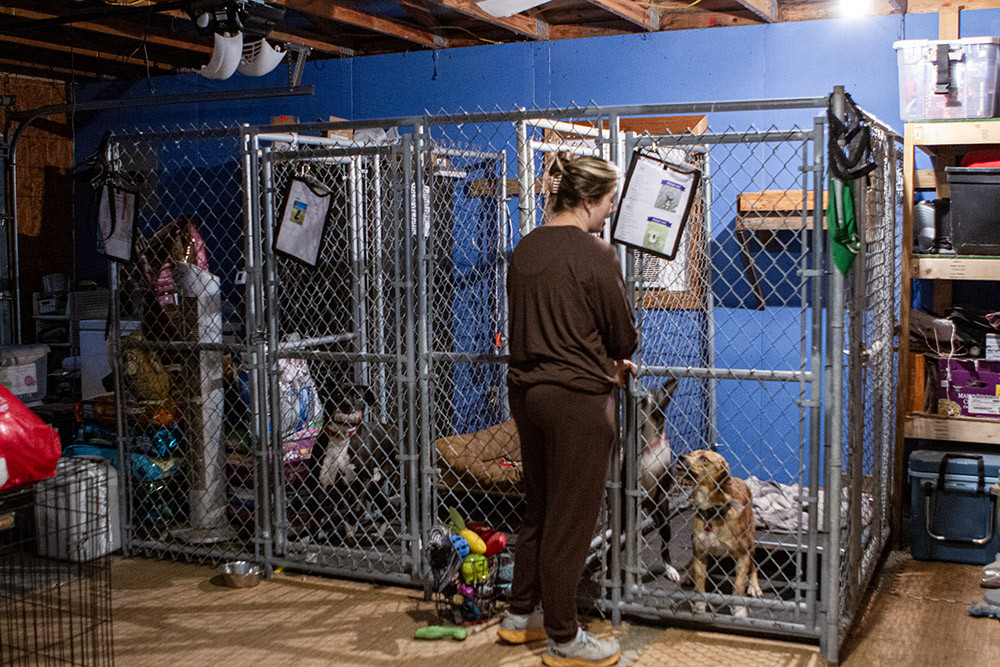No Voice of Their Own
The road into Clarksburg, Missouri, is hardly wide enough for two combines to pass without trading paint. It rises and falls over a quilt of corn stubble and winter‑wheat green, then drops you—almost apologetically—onto a single paved block of town. From the highway it looks like a place where nothing happens, where Tuesday is identical to Monday except that the postmaster wears her blue cardigan instead of the gray. Yet here, behind a white farmhouse trimmed with last year’s paint, Michaela Cate has carved a refuge out of stubbornness and galvanized pipe—a rescue for the creatures most folks step around like potholes.
1 An Accidental Beginning
Michaela did not set out to become the county’s conscience. She was thirty‑two, working the front desk at the Co‑op in nearby California, Missouri, answering phones about fertilizer spread rates and bulk diesel. The days were ordinary as oatmeal until the afternoon she swung into the Food 4 Less lot for a sack of potatoes and spotted a dog nosing through a Styrofoam clamshell. Ribs like barrel hoops, tail thumping a rhythm of last‑chance hope. She whistled. The dog ambled over—no collar, plenty of copper‑colored mites in its ears—and leaned his full hunger against her shins. With that simple press of weight, the story bent. Michaela opened the passenger door. The dog climbed in like he’d been waiting on the invite all his life. She named him Spud, after the errand she never finished.
Spud became the fifth dog in a house already fitted for four. She scrounged a spare crate from an uncle, wedged it beside the water heater, and told herself it was temporary.

In a town where a new recipe at the bar & grill qualifies as news, one woman taking on strays quickly became lore. Folks started leaving dogs the way others leave church casseroles—quietly, on the porch, with a note and a whispered apology: Can’t keep him; husband sick; keeps chasing calves; sorry. Dogs arrived in the hush before dawn, nails clicking across the wooden steps, noses pressed to the screen door, waiting for the smell of scrambled eggs.
2 The Math of Mercy
Twenty‑seven. That’s the count so far—twenty‑seven dogs re‑homed, vetted, vaccinated, healed of mange, heartworm, or the wound of simply being unwanted. Twenty‑seven is also twenty‑seven rabies tags paid out of Michaela’s paycheck, ninety‑four bags of kibble, and untold gallons of bleach erased across kennel floors. She works full‑time at the Co‑op, part‑time evenings tallying books for the hardware store, and somehow still logs Thursday afternoons balancing the food‑bank ledger because, she says, “Hungry’s hungry, whether it walks on two legs or four.”
Inside the garage the concrete floor is scrubbed and sealed. The kennels line one wall, pristine steel pipe uprights, chain‑link sides hung with laminated cards: Name, Intake Date, Weight, Temperament, Vaccines. Cade, her partner, welded the frames on weekends, sparks flying into humid air thick with the smell of cut metal and dog shampoo. Cade seldom says much; his love language is sweat and fence staples. When they argued about the growing pack, he’d bite off the rim of a smile and give her a knowing node. That was permission enough.
Each kennel has a raised cot, a stainless bowl, and a toy—rubber chicken, tennis ball, or knotted rope depending on the occupant's demeanor and overall appetite for such "finer things." A box fan murmurs at one end, pushing heat toward an exhaust vent Cade cut through siding. Above the noise hangs the tang of bleach and optimism.

3 Paper Walls and Moving Goals
Missouri law calls her operation a boarding kennel—that is, if she wants to stay on the right side of inspectors. When the first state inspection went down, Michaela failed it within twelve minutes: feed sacks stored on concrete, no laminated cards on the kennels and other nit-picky items. The inspector's words droned on as he cited statute numbers. She watched his pen scratch the page and felt her chest plate shift like a barn board in freeze‑thaw. Failure is expensive. But so is giving up.
She paid the re‑inspection fee out of her meager savings, printed the regulations, and taped them beside the washing machine. Then she and Cade set to work—lifting fifty‑pound feed bags onto pallets, running a dehumidifier line to the drain, cataloging every shot record like sacred scripture. Within a the state seal stamped Approved, Provisional. She framed the certificate, hung it in the garage where the dogs couldn’t pee on it, and christened the place Mission Monipaw—Moniteau County’s first and only licensed shelter.
4 Pushback and Kryptonite
Not everyone applauds the rescue. In towns this small, virtue can look like vanity from across the fence line. One neighbor complained about barking. Another hinted that dogs carried disease. The county dispatcher called twice about so‑called vicious animals loose on Highway 87, both times describing the same aging wobbly canine. To her face they grumble, but online the words grow sharper—Facebook threads accusing Michaela of hoarding, of drawing strays into town, of “wasting tax money”— though she’s never taken a dime of it.
She answers criticism with data sheets: vet receipts, adoption contracts, before‑and‑after photos of mange turned to velvet fur. Most skeptics fall silent. Those who don’t find themselves staring into a woman whose gentleness ends exactly where a dog’s safety begins. “If I need to be ruthless,” she warns, eyes level, “I will.”
Her kryptonite, though, is the ceaseless tug-of-war between her advocacy and the public’s misunderstanding. Her mission is as unrelenting as it is tender, as unforgiving as it is filled with love.

Then there is fatigue—the bone‑deep ache that creeps in around midnight when the last kennel is latched, the medications logged, and the house lights darken except for the glow of the rescue’s PayPal page on her phone. Donations come, trickle‑style: twenty from a retiree in Sedalia, five from a second‑grader who sold bracelets, a hundred slipped anonymous through the mail slot in an envelope marked simply “For the hounds.” Still, some nights the math doesn’t balance. That’s when doubt circles like a coyote at the fence. Michaela meets it with the same stare she gives skeptics—and keeps going.
5 Triage, Triumphs, and the Twenty‑Eighth Dog
The latest intake arrived as most others, scared and skeptical of human kindness. She names each dog and logs it in her calendar that measures time by rescues, not months.
The photo—before and healed—will one day join twenty‑seven others in a bulging 4x6 photo portfolio. Each frame hand‑lettered: BELLA → Service Dog in Columbia. HANK → Kids’ Reading Buddy, McGirk Elementary. No frame gets removed; this gallery stands as both scoreboard and reminder that mercy never finishes its innings.
6 The Day We Met – Hope & Generosity Tour Stop
I'd read about Michaela in the local newspaper. A headline story told of 27-dogs saved and adopted out. I met her at her home, rolling Josie up a gravel driveway and parked along side an ancient oak where she rattled to a halt. She met me at the door and invited me for coffee. We chatted a bit then went to look over the facilities. As she detailed the surroundings, she noticed a dog had pissed in the kennel, unable to hold it until a morning walk. She grabbed some bleach and roll of paper towels and began a cleanup routine she knew by heart.
We stood watching, asking questions as other dogs took turns thrusting noses through the fence for a sniff of the newcomer. She told me the first dog story, the failed inspection, the three‑job weeks. She spoke without pity or polish, as if recounting chores rather than miracles. Her eyes lit most when describing a newly placed dog that was slated to be a service dog.
The longer she talked, the heavier my enveloped thousand dollars felt in my jacket. I had meant to give the money discreetly—snap an iPhone pic, shake hands, be on my way before she could refuse. But destiny seldom minds itinerary. Instead I listened for an hour, Only when the sun climbed high enough to silver the chain‑link did I take the bundle of cash out and slide it across the table.
She turned it over like a library book, eyebrows knotted. *
“This is just a gift. A $1,000 cash. No strings. You can do with it whatever you choose. It's a way of giving back for all you do without ever asking for anything in return."
Tears started to flow once the reality set in. Her shoulders slumped as though some interior brace had, for once, been permitted to relax. She turned the stack of cash over and over in her hands, as if to make sure it wouldn't suddenly dematerialize. "Thank you, thank you so much," she said. "You don't know how many dogs this will save," her gratitude hummed in the air like power lines under frost.
I asked the question I’d asked of rescuers before her—Why keep doing this when the flood never stops? She watched a barn swallow dance across the soybean field, let two full breaths slide by, then said:
“They didn’t ask to be born. Didn’t ask for the chain or the ditch or the bullet. We did that. So we owe’m something decent in return.”
7 The Wide Echo of Small Kindnesses
Clarksburg will not erect a statue to Michaela Cate; the town budget struggles to replace cracked sidewalk squares. Mission Monipaw will likely never trend on social media beyond a few earnest #AdoptDontShop shares. Yet out there in the big roaming world—from Kansas City lofts to Ozark farmhouses—twenty-seven dogs (and counting) snooze on couches or guard back doors or steady the heartbeat of anxious children, each life a ripple widening mile after unseen mile.
A stray saved is not the whole ocean; it is merely one breath of surf pulled back from oblivion. Michaela knows this, and still she tosses the starfish, one ribby shadow at a time, into the froth. Evening after evening when the barks quiet, she stands a moment in the hush. She listens for gratitude—hers, not theirs—rising like crickets in the soybean dark. Then she locks the gate and goes inside to rest for whatever knock comes next.
Because in the folds of Missouri, where skyline cedes to soybean and seasons count by combines, ordinary women sometimes choose the extraordinary labor of opening their doors a little wider than reason. And the world—dog by dog, kindness by kindness—grows wider with them.
When you subscribe to the blog, we will send you an e-mail when there are new updates on the site so you wouldn't miss them.

